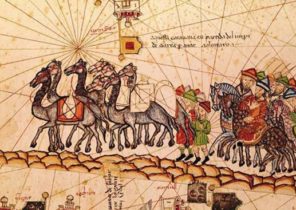Throughout modern history the political opposition promoted his ideas and brought them to the masses with the help available at the time of communication. For example, Lenin wrote a letter from Switzerland to Russia, and the shipment took a lot of time, and at the beginning of the XX century there was cassette tape, which Ayatollah Khomeini used during the Iranian revolution in the 1970-ies. Finally, during the revolutions of the “Arab spring”, we have seen the impact of technology live broadcast.
For nearly a century, the world has made tremendous strides in technology and communications that have contributed to the dissemination of information and the disappearance of barriers between people. First, we switched from books and letters on cassette, then on television and finally the Internet, which is available to us everywhere with smart phones. Now, for the exchange of ideas and views, even extremist and banned, it is enough to wave your finger across the screen or click a mouse button.
This technological revolution has had equally important political consequences because it deprived the political system of many types of weapons, which they used to suppress dissent. This weapon passed into the hands of the opposition abroad and serves its interests — the promotion of their ideas and fomenting of revolutions and protests in their countries.
“Letters from afar”: the letters of Lenin became more important than his speeches
The Bolshevik revolution broke out in 1917, more than a hundred years ago, when the leader of the Russian socialist Vladimir Lenin the third year was in Switzerland, where he arrived in 1914, to escape repression by the Russian police.
In Zurich, Lenin wrote books, acted and met with representatives of the intelligentsia, until I heard about the overthrow of the Russian Tsar and the beginning of the revolution. At that time Lenin said that the press is the most important thing, and instead of lectures and meetings has decided to send long messages from his exile in Switzerland to Russia, demanding that the workers broke with the bourgeois liberals and seized power themselves. His letters were published in the newspaper Pravda published by the Communist party.
It was his only way to convey your voice to the masses and to ensure that his ideas were taken on Board. In addition, he sent his letters to the Norwegian city of Oslo, comrade Alexandra Kollontai. She, in turn, sent them to St. Petersburg, and then took a long time before these letters were published in the Russian press and reached the revolutionary masses.
A few weeks after the overthrow of the tsarist regime, Lenin decided to return to Russia to be in the center of the revolutionary events that led to the creation of the Soviet Union, led by Vladimir Ilyich.
From exile in France. As the Ayatollah overthrew the Shah’s regime with the help of magazines
The Iranian revolution of 1979 has caused a political earthquake in the middle East, the consequences of which are felt to this day, even after 40 years. The irony is that the most influential figure of the Iranian revolution Imam Ayatollah Khomeini, most of the time was abroad in exile, whether in the Iraqi city of Najaf, in Turkey, or having received asylum in France before the revolution.
As Khomeini influenced the course of the revolution and established themselves as its sole leader, despite the fact that most of the time was in exile? The secret was in cassette recordings, which he sent to Iranian territory. Using these tapes it with unprecedented boldness criticized the regime of the Shah, and thus gained the support of thousands of Iranians who were dissatisfied with the dictatorship.
Khomeini began to use a cassette tape when he was expelled from residence in the city of Qom to Najaf. Because of its attachment to the Godfather he became every week to send his followers a recording of the sermon. They quickly spread to other circles, and in terms of content, they soon turned from religious surveys in a political Manifesto, which was recognized throughout Iran.
The enormous influence these statements of the Iranian leader, it became obvious a few months before the beginning of the revolution when he began to send a lot of recordings of their performances to the armed forces. Their idea was simple: they should not serve the Shah, because the Shah is the devil incarnate, and they — weakened soldiers of Allah who can’t shoot their Muslim brothers, because each bullet in the heart of a Muslim is a bullet in the heart of the Quran. Iranian soldiers should return to their villages and cities, in the mosque, to Allah.
In the autumn of 1977, Khomeini became even more actively pursue its advocacy efforts on the army, and began to call soldiers to carry weapons, as stated in the book “Defender of the ayatollahs”, written by Egyptian journalist Mohammed Hasanein the Heykel.
No doubt, the effect of the records was due to Khomeini’s religious symbolism and beautiful speech, as his voice seemed to have enveloped listeners in a gentle waves led them to a state close to ecstasy. This, in particular, writes in his book Heykel.
Ironically, the political system created by Khomeini after the victory of the revolution, began to limit the use of the Internet and block international social networks such as Twitter, Facebook and Telegram, that it became evident during the Iranian protests after the presidential elections in 2009, as well as demonstrations in early 2018.
The Algerian movement: video stream against the expulsion and repression
In February of last year in the Algerian events on the arena played a major role of technology “direct transmission” (live) protests and demonstrations began against the regime of President Bouteflika and managed to get him to withdraw his candidacy for re-election for a fifth term, and then to retire. These technologies allowed us to prove offences police forces in the air, put a lot of pressure on the ruling regimes and forced them to consider new variables. In addition, it has allowed foreign opposition or those who are banned from politics, Express yourself and promote your ideas both before and after the Algerian protests.
One of the most famous examples is a dissident Mohammed al-Arabi Zaituc, who began his career in the diplomatic corps in the early 1990-ies, has not yet decided in 1995 to retire. He condemned the decision of the military regime to suspend the 1992 elections, and in this connection moved to the UK where his career began with opposition publications and statements to the press.
In 2008 Satut began to publish videos on YouTube, in which he criticized the Algerian authorities, but the number of subscribers at that time did not exceed several hundred people, since few Algerians have access to the Internet and was interested in political issues. On the contrary, the policy has caused disgust.
He also participated in some programs on the channel “al Jazeera”, in particular in the “Opposite direction”. He then disappeared from the screens in the background of the understanding reached by the Qatari and Algerian regimes, and began to appear exclusively on open platforms, including social networks that provide the opposition a great opportunity.
In 2011 during the “Arab spring” Mohammed al-Arabi Satut tried to use the atmosphere of the events, to push the Algerian people for regime change, but faced with many obstacles during that period prevented his radical speeches to resonate among Algerians. The problem was the absence of the country wide Internet access, in addition to other economic and social context and a completely different state of health of President Bouteflika. In other words, 2011 was the right time for a change, have dreamed of the Algerian opposition. He had to wait eight years.
It is impossible to ignore the important role that Satut played during the Algerian movement that emerged in 2019, because he was one of the most popular among the masses of figures. The Algerians were going in their cars or at tables in the cafe where one of those present included the phone, and listened to live broadcasts Satute. He told me that they couldn’t read in Newspapers or hear on public and private channels, for example, what happens behind the scenes of the meetings of generals, about their secret struggle, the loyalty, the wealth, the conflict between the intelligence, the army and the President, as well as their relationship with the business. All they could hear from the opposition, which rejects all political and party system of the country where the election outcome is determined by the regime.
Al-Arabi Zaituc was one of the most prominent political figures calling for participation in protest actions on February 22 and soon after it began its Facebook page and channel on YouTube became the most visited page, despite the poor quality of sound and image in most of broadcasts, number of views above the views of Newspapers and news channels spending billions on their luxurious Studio. To this day it remains one of the most popular politicians on social media: live shows, which he runs every night, watching hundreds of thousands of people, and his name chanted by protesters in many Algerian provinces.
In Egypt live broadcast provoked demonstrations
Can the revolution be triggered externally by using the mobile phone camera? It almost happened once, and no surprise if soon happens again.
21 September 2019 in several areas of Egypt began on the night of the demonstration, the first of its kind in recent years. The immediate cause of the beginning of a new wave of protest was a former Egyptian actor who publish videos on the Internet, which reveals previously unknown information about the Egyptian authorities. He does it while in one of the hotels in Spain and frequently leaving live via Facebook.
Muhammad Ali found that the live broadcast is the best way to cover a larger segment of the Egyptians, especially if its goal is to create content that is critical of power and reveals hidden facts about the regime and the corruption associated with the projects, President Al-Sisi, his entourage and even family members. It is impossible to hear on the satellite channels, or in the Egyptian media, which are controlled by the authorities.
The phenomenon of Muhammad Ali is not only related to the fact that he demonstrated how to reach the masses, despite the persecution of media and blocking of various Internet sites. He also proved that this influence of the fields for the review can be translated into reality, and to spark a major movement.
Muhammad Ali used the usual method — he just said that, of course, met with criticism and accusations. Said he was not up to the intellectual and cultural level of the opposition elite, especially when inclined to analyze and interpret some very complex political phenomena such as terrorism, Arab spring and others.
Nevertheless, it is straight, simple communication style, devoid of complex terminology, commonly used by politicians, allowed the actor to reach wider segments of the population and soon become a “folk hero” exposing the corruption and risk their lives for the country. That’s what forced the Egyptians to answer his call and come out in protest against the regime of President Al-Sisi.
This unexpected response was a great shock not only for the Egyptian regime, which was surprised by the number of protesters on September 21, but also for the intellectual elite, which may have underestimated the phenomenon of Muhammad Ali, and did not believe in the ability of an actor, broadcasting live from Spain, influence on the Egyptian street, which remained silent for several years, despite numerous abuses of the Egyptian regime.







